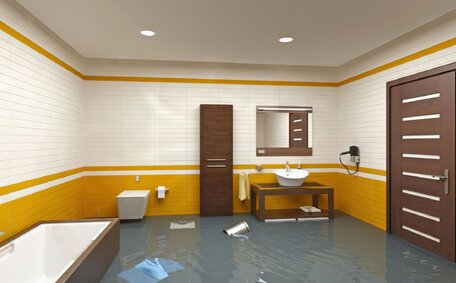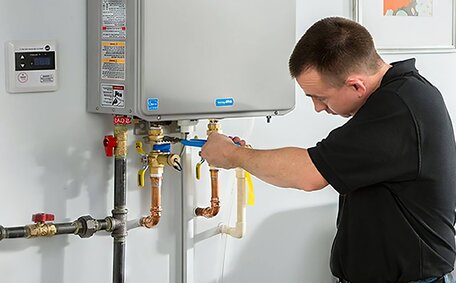
Signs Your Hot Water System Is Failing
Common signs your hot water system is failing include strange noises, rust, leaks, inconsistent temperature and pressure. Call our licensed plumbers if you notice these issues for repairs.
Read MoreAs the imperative to go green becomes more pronounced, the plumbing industry is seeking more sustainable solutions for pipe repairs. Conventional approaches such as traditional pipe repair, which requires trenching and replacing whole sections, can harm the natural terrain and result in surplus waste. Pipe relining stands as a superior alternative that mitigates environmental concerns whilst ensuring durable pipe repairs.
The relining process involves inserting a new lining within your pipe, bypassing the need for excavation. Specialised epoxy resins or polyethylene materials are used in CIPP relining, solidifying to forge a robust new pipe interior. Minimal excavation is required, reinforcing pipe relining’s role in protecting adjacent ecosystems.
The chosen materials for relining are engineered for enduring durability and chemical resistance to maximise repair longevity.
For issues like blocked drains, trenchless pipe repair through pipe lining rejuvenates internally damaged pipes. This method involves installing a durable lining within the old pipe, effectively creating a new pipe inside the compromised one, negating the need for excavation or complete replacement.
The key steps are:
Eco-friendly relining offers efficient pipe repairs highlighted by landscape preservation, reduced waste, less material used, and a smaller carbon footprint.
Pipe relining applies a resilient lining that resists corrosion, cracks, root intrusion, or leaks, offering a cost-effective, enduring solution compared to traditional repairs.
Trenchless pipe relining offers significant environmental advantages, enabling repairs to pipes without digging and the environmental toll of traditional pipe replacement methods. By rehabilitating pipes internally, there is minimal disruption to the surrounding landscapes and ecosystems.
Pipe relining reduces waste by up to 90% compared to traditional pipe replacement. Its no-dig approach eliminates soil erosion and reduces landfill waste. Additionally, less digging leads to fewer greenhouse gas emissions from heavy machinery, lessening the environmental impact.
The pipe lining materials themselves have eco-friendly properties too. Epoxy resins, polyethylene and fibreglass liners can also be durable, non-toxic options with low carbon footprints for production and transportation.
The extended durability of pipe relining, paralleled with cost efficiency that avoids the need for frequent repairs and additional resource use in future years, makes it a choice worthy of consideration. Beyond curtailing storm water waste, pipe relining as a solution for your water systems shows an energy efficient and improved flow capacity and water efficacy of rejuvenated pipes, conserving water throughout the years.
Through our pipe relining services, we sustainably address diverse plumbing challenges while protecting local ecosystems and biodiversity from disruptive pipe replacements.
A major environmental benefit of pipe relining is its ability to avoid excavation and the associated ground disruption. excavation which can destroy vegetation, damage tree roots, compact soil, and fundamentally alter natural habitats.
The Marrickville area, much like your home, is a place of vibrant diversity with native plants and wildlife. The trenchless drain solutions we offer through pipe relining enable crucial repairs while preserving our cherished local bushland surroundings. There’s no necessity to devastate gardens or uproot mature trees for the sake of fixing broken pipes.
By rehabilitating pipes from the inside, relining offers much more than a repair; it prevents the habitat loss that excavation-heavy techniques like pipe replacement or spot repairs would otherwise cause. The rich inner-west ecology stays protected, including the endangered EECs (Endangered Ecological Communities) present around Marrickville.
The polyethylene and epoxy resin materials used in pipe relining also avoid introducing toxic contaminants into the soil or groundwater. This helps maintain the health of ecosystems and wildlife populations that coexist in urban areas.
Ultimately, opting for trenchless pipe relining over traditional pipe repairs is a sustainable choice that benefits Marrickville’s local environments. It enables critical plumbing repairs without damaging the beautiful natural landscapes that the community values and enjoys.
This method decreases the necessity to replace old metal and plastic pipes, which would typically contribute to landfill waste.
The polyethylene, epoxy resin, or fibreglass used for relining are eco-friendly, notably for their lower lifetime emissions.
Pipe relining requires only targeted sections to be renewed, avoiding a full system replacement. It significantly decreases the demand for new materials, transport-related pollution, and waste from excavation.
Enhanced flow efficiency in relined pipes not only improves function but also helps prevent tree root intrusion and conserves water over time.
Opting for pipework rehabilitation over removal and replacement authentically serves both environmental and economic interests. Pipe relining preserves pipe assets, avoids landfill strains, and signifies a greener approach to essential repairs.
There are several eco-friendly materials commonly used in modern pipe relining that provide durable repairs with minimal environmental impact:
These eco-friendly alternatives avoid many downsides of traditional pipe materials like galvanised steel, copper, cast iron or concrete.
While plastics like PVC have some negative environmental impacts in production and disposal, pipe relining uses relatively little new material. And modern plastics last longer, require less maintenance and preserve pipe infrastructure better than outdated materials.
So for creating a durable internal pipe lining that restores function for decades, while minimising excavation and new resource use, materials like polyethylene and epoxy resin tick all the boxes for an eco-friendly pipe renewal solution.
Polyethylene and fibreglass stand out as two of the most eco-friendly and durable options, but one might wonder the lifespan of these pipe relining materials.
Polyethylene pipe liners are supple tubes crafted from HDPE (high-density polyethylene) plastic. HDPE originates from refining crude oil and ethane gas but has less environmental impact than many other plastics. It’s also highly resistant to corrosion, abrasion and chemicals.
Polyethylene liners create an integral, jointless barrier, preventing leaks with a lifespan of 50-100 years. The impressive longevity of pipe relining materials minimises the need for repeated repairs and conserves resources in the long term.
Meanwhile, fibreglass liners consist of glass fibres bound in an epoxy resin. Fibreglass is impervious to rot, rust, cracking and tree root intrusion, expected to last at least 50 years.
Both polyethylene and fibreglass make ideal pipe lining materials as they don’t decay or deteriorate over time. Their longevity maintains the sustainability of existing pipe assets, avoiding unnecessary replacements. And being inert once cured, they won’t contaminate soil or waterways either.
Whether it’s polyethylene or fibreglass, these pipe liners exemplify sustainability due to their durability and non-leaching properties.
Epoxy resins play a vital role in many pipe relining processes, especially with Cured-In-Place Pipe (CIPP) lining. Choosing an epoxy resin that is non-toxic and environmentally friendly is crucial for an eco-conscious repair.
Brawoliner uses a specially formulated epoxy resin for CIPP lining, one of the most environmentally friendly options that meet European health standards. It is solvent-free, non-corrosive, and free of any toxic additives. Once cured, it is completely inert and assessed as non-hazardous for soil or waterway contact.
Being derived largely from plant-based materials rather than crude oil during production, Brawoliner’s resin also has an exceptionally low carbon footprint. It is one of the most effective solutions and outperforms traditional bisphenol A epoxies on environmental sustainability.
So by opting for a pipe lining system like Brawoliner that utilises green epoxy resins, plumbers can achieve long-lasting repairs without risk of toxic leaching over time. This showcases how pipe relining can align with eco-friendly principles for the good of local communities and habitats.
Pipe relining with eco-friendly materials has been implemented successfully in many real-world projects, showcasing the practical benefits.
In Lane Cove, ageing terracotta sewer pipes were successfully renewed with an epoxy resin-infused polyethylene liner.
The Lane Cove project began by removing tree roots and progressed to renew 175 metres of pipeline without trenching. This cost-effective strategy prevented digging in landscaped areas, avoided sewage spillage, and enhanced long-term pipe performance.
Another commercial building project relined corroding cast iron drainage pipes under the concrete basement slab, using the trenchless CIPP epoxy resin method. Pipe relining proved to be a quicker, tidier, and more sustainable alternative to jackhammering the slab and replacing the pipes. For property owners, the benefits were unmistakable: the procedure minimised commercial disruption and enhanced the building’s eco-friendly profile.
These case studies illustrate how relining methodologies tackle pressing issues eco-consciously. The solutions are effective and long-lasting, without damaging landscapes or surrounds. The advantages pipe relining offers are manifold, including the use of robust, sustainable materials such as polyethylene and epoxy resin liners, securing eco benefits for generations.
As environmental awareness grows, pipe relining clearly represents the most sustainable option for essential plumbing repairs and maintenance.
Pipe relining can help conserve the environment, evade excavation waste, and limit interruptions by repairing damaged pipes internally rather than opting for extensive digging and replacement. The eco-friendly materials like polyethylene, fibreglass and epoxy resins used in relining can help with your plumbing requirements, offering longevity, corrosion resistance and non-toxic properties.
Looking ahead to the needs of future plumbing, trenchless pipe relining enables pipes to be restored in-situ for decades of future use. This avoids repeat repairs and new resource demands down the track. Relined pipes also promote water efficiency over time.
At Marrickville Plumbing, we are dedicated to sustainable methods, offering top-tier plumbing services for pipe relining in Sydney residents can rely on. Our brawoliner system for pipe relining harnesses advanced sealing materials for robust repairs with minimum ecological impact. Thanks to the pipe relining solution we provide, the local landscapes that the Marrickville community values remain unspoiled.
For dependable, best pipe relining solutions that tackle pipe problems without environmental detriment, email or call our team today. Your property’s pipe infrastructure and our stunning environment deserve sustainable upkeep; if you notice any discrepancies, don’t hesitate—contact us today.
Common signs your hot water system is failing include strange noises, rust, leaks, inconsistent temperature and pressure. Call our licensed plumbers if you notice these issues for repairs.
Read MorePipe relining is an eco-friendly alternative to pipe replacement that uses materials like epoxy resin to repair pipes without digging. It produces less waste and emissions than traditional methods. Learn about the environmental benefits of trenchless pipe relining.
Read MoreReplacing an outdated electric, gas or solar hot water system with a more efficient heat pump or solar model can significantly reduce your energy bills and carbon footprint. Take advantage of available rebates. Contact us to retrofit your old system today.
Read MoreMarrickville, 2204 NSW
We will call back as soon as possible.




